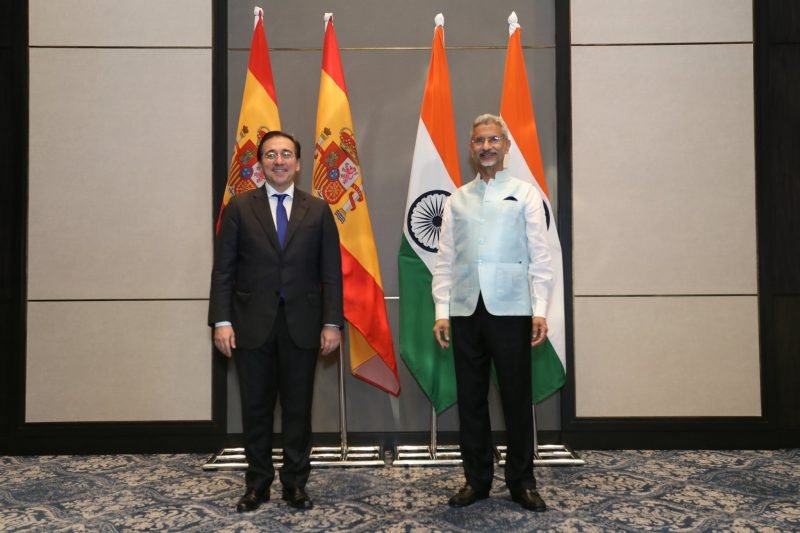India-Spain relations: Finding common ground

José Manuel Albares, Spain’s Minister of Foreign Affairs, European Union and Cooperation, visited India on June 15. This was his first official visit to India. Albares’ visit assumes importance since it is one of the first high-level visits to India from Spain in a long time.
During his visit, Albares held talks with his Indian counterpart Dr. S. Jaishankar. Both the foreign ministers reviewed the bilateral relations. At the same time both also committed to add new depth and content to the relationship.
Spain remains one of those countries with which India’s relations are still in the process of development. While India has close engagements with the European Union (EU), France, Germany and the United Kingdom, the relations with Spain are yet to reach that level. It is important to consider the reasons for the relatively underdeveloped nature of the India-Spain relations as also how India and Spain could find common ground to strengthen their ties.
Different vectors of foreign policy
One of the principal reasons for the India-Spain relations not to take-off has been the two countries’ different vectors of foreign policy.
After independence in 1947, India’s foreign policy has revolved around neighbourhood in South Asia as well as promoting the Non-Aligned Movement. As a newly independent country, India prioritized support to anti-colonialism. India supported independence of several countries that were colonies in Asia and Africa. Also the post-Second World War period, which coincided with India’s post-independence period, was characterized by formation of two blocs – one bloc led by the United States and the other led by the Soviet Union. India, while choosing to protect interests and maintaining cordial relations with all the countries, chose not to be a part of the either bloc and so initiated the Non-Aligned Movement. India’s foreign policy underwent a change with the end of the Cold War. The post-Cold War period saw India strengthening its relations with the United States as well as several European countries.
As regards to Spain, its foreign policy has revolved around the EU, Latin America and North Africa. While Spain joined the EU only in 1986, in recent years its engagements with the group have grown. Despite Spain being considered as an outlier in the EU, Spanish politicians across different parties consider European Union to be the main focus of Spanish foreign policy. Latin America, by virtue of shared language, culture and history, is another main area of focus of Spain’s foreign engagements. Spain also acts as a link to strengthen Latin America’s relations with the EU. North Africa, also called Maghreb, as a neighbouring region and also due to historical connections is one of the priority areas in Spain’s foreign policy. Spanish city-enclaves of Ceuta and Melilla are located in North Africa and border Morocco. Besides, Spain is often used as a gateway to Europe by North African migrants. This makes North Africa important for Spain from security perspective.
On account of their respective foreign policies focusing on different priorities, India and Spain have had little in common to increase their engagements.

Finding common ground
To strengthen their relations, India and Spain would need to find common ground at bilateral level and also at multilateral levels. The emerging world order is a unique mix of continuation of the old order and emergence of the new simultaneously. China’s belligerent rise across various continents has created economic and strategic challenges to the rules-based international order. China’s actions are directed at creating a China-centric order challenging the United States and other democratic nations. At the same time, the Russia-Ukraine war is pushing Europe towards becoming a theatre for conflict between major world powers. Europe has already endured this phenomenon during the two World Wars and during the Cold War.
Several European nations such as the UK, France, Germany and the Netherlands have been exploring to widen their economic and strategic sphere outside of Europe. Spain, as a European power, must also look to expand its horizons. However, continuation of the Russia-Ukraine war may lead the European countries to rethink their strategy, even if it is on a temporary basis.
As different plurilateral formations emerge as a response to the volatile global order, Spain needs to contextualize itself in these. A number of international institutions need to be reformed to reflect the current reality and to accommodate the countries that are not part of these groups.
As per the IMF data for 2020, Spain is the 14th largest economy in the world in terms of GDP. Spain’s GDP is $1.28 trillion. Despite this, Spain is only an invitee to the G-20 and not a member. India is a member of the G-20 and is set to host the G-20 Summit in 2023. India could push for Spain’s case to be included as a member in the G-20 instead of being an invitee.
India’s foreign policy in about the past two decades has responded to the flux in regional and global geopolitics. India has made efforts to play its part in international politics. As a result India has emerged as a major power in the Indo-Pacific Region. Spain needs to adopt a similar strategy to look beyond its traditional sphere of foreign policy. India could be Spain’s partner in expanding the latter’s engagements. Spain could consider formulating a policy that focuses on Asia or the Indo-Pacific Region, similar to India’s Look East Policy and Act East Policy. While major powers of the world need to accommodate Spain in the restructured global polity, India could play a pivotal role for Spain.
Recently, India and the EU have resumed talks for a free trade agreement (FTA). India also concluded a trade pact with Australia in April and with the UAE in February. India and Spain could consider similar agreement to boost their bilateral trade.
Finally, the bilateral relations only get strengthened with frequent high-level visits. This factor is lacking in India-Spain relations at present. Hopefully, the visit by Albares to India should set the trend of frequent engagements and not remain an isolated event.


















